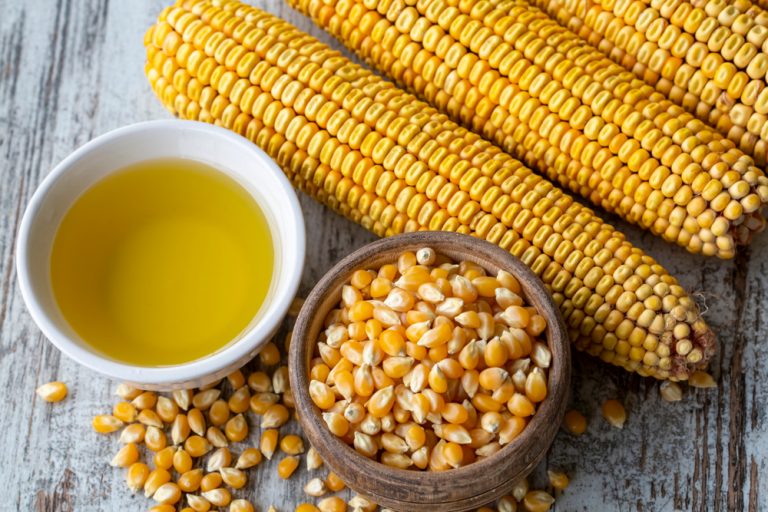Corn oil is widely considered an oil with numerous health properties. Meanwhile, the ratio of omega-6 to omega-3 fatty acids in corn oil is very unfavourable. Excessive amount of omega-6 in the diet intensifies inflammatory processes and increases the risk of many diseases. Check the properties of the corn oil.
How is corn oil made?
Corn oil is made from corn kernels. Commercially, it is present only in refined form as light yellow, tasteless and odourless oil.
Corn oil was first industrially produced in 1889, and large-scale production began in 1910. The main producer of corn oil is the United States, where about 1,800,000 tons of this fat is produced annually. Much smaller quantities of 100,000 - 200,000 tons per year are produced in China, Turkey, Brazil, Japan and South Africa.
Corn oil benefits
Corn oil, like all other oils, contains only fat. Among the vitamins and minerals in corn oil, we can only find vitamin E and small amounts of vitamin K.
Omega-6 fatty acids make up a very high percentage of all corn oil fatty acids. Omega-6 fats are necessary for the proper functioning of the body, but in excess, they have a pro-inflammatory effect. They must be consumed in balance with omega-3 fatty acids, the amount of which in most people’s diet is too small.
The correct ratio of omega-6 to omega-3 in the diet is 4:1. The average diet contains these fats in a ratio of 20 parts to 1. However, in corn oil, this proportion is 83:1 (sic!). This means that a large amount of omega-6 in corn oil is not an advantage but its actually rather a defect of this type of oil.
Corn oil among vegetable oils is one of the richest in phytosterols and tocopherols (a precursor of vitamin E in human metabolism). Phytosterols are plant substances with a structure similar to animal cholesterol. They have been proven to have a wide health-promoting effect, especially for lowering blood cholesterol level.
The most presented in corn oil is beta-sitosterol (63-70% of all phytosterols). In total, corn oil contains 968 mg of phytosterols in 100 g. Tocopherols, i.e. substances with vitamin E-like activity, have antioxidant activity and protect fat against oxidation and rancidity.
Gamma-tocopherol is most commonly found in corn oil and accounts for 68-89% of total tocopherols. The second most important is alpha-tocopherol.
The amount of vitamin E in corn oil is 14.3 mg/100g. One tablespoon covers the body’s need for vitamin E in 13%. Ubiquinone with antioxidant activity is also found in corn oil.
Corn oil - health properties
Corn oil due to the high content of polyunsaturated fatty acids lowers the level of LDL lipoproteins in the blood, which are involved in the formation of atherosclerotic plaque and are a risk factor for heart attacks.
It has no significant effect on HDL lipoprotein concentration, however, by lowering LDL it has a positive effect on the ratio of both lipoproteins in the body. Corn oil can also lower triglycerides level.
Corn oil is a source of ubiquinone (coenzyme Q10), which is an antioxidant. In many diseases, including cardiovascular diseases, neurodegenerative diseases, AIDS, cancer, coenzyme Q10 deficiency can occur. That’s why it is worth considering its higher intake, even in the common diet.
Corn oil contains significant amounts of phytosterols. Phytosterols are substances with anti-inflammatory potential, and a diet rich in them helps prevent diseases such as type II diabetes.
Plant phytosterols have a similar structure to animal cholesterol. They block their absorption and reduce blood levels. A diet rich in phytosterols has proven to reduce cholesterol. Thanks to the content of vitamin E, linolenic acid and phytosterols, corn oil can reduce the risk of heart disease.
Is corn oil bad for health?
Despite some health benefits, corn oil is not considered healthy. The main reason is the high concentration of omega-6 fatty acids, which are recommended to be limited.
The presence of phytosterols and vitamin E is a thing for most of the vegetable oils. Health benefits, such as lowering cholesterol or reducing the risk of certain diseases, are also associated with the consumption of other vegetable oils.
A much healthier choice is unrefined olive oil, unrefined rapeseed oil or linseed oil for raw use. You can fry in refined olive oil. However, lard or coconut oil is recommended for frying at the high temperatures.
Corn oil - use in the kitchen
Corn oil has a neutral taste, which means that it can be used in many dishes. Suitable for cold and warm use. It is much more often used for frying than as a cold addition to salads and other dishes.
High stability and temperature resistance make corn oil ideal for long-term deep frying because it begins to smoke only at temperatures above 230 degrees C. Breaded products, e.g. meat, vegetables, shrimps etc. fried in corn oil are very crunchy. The neutral taste and light texture allow the use of corn oil as an ingredient in cakes, muffins, cakes, etc.
Corn oil is particularly good for stir-fry dishes - fried in a wok at a very high temperature and for a short time.






